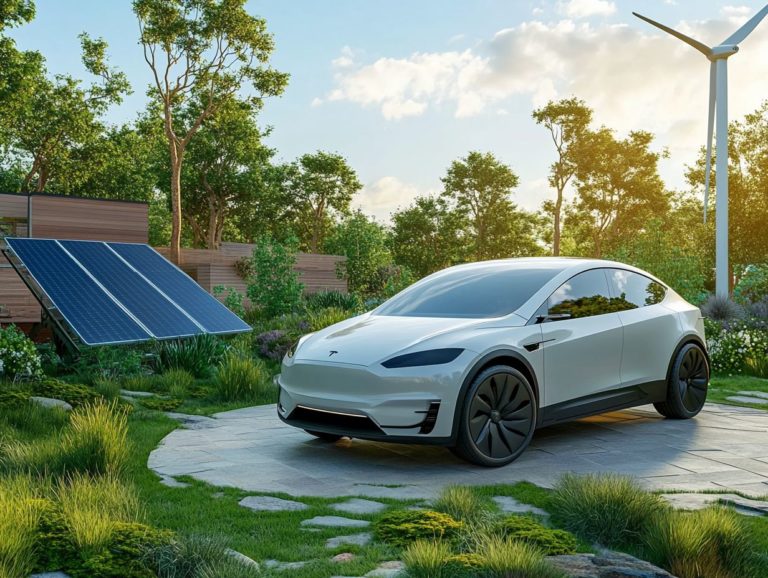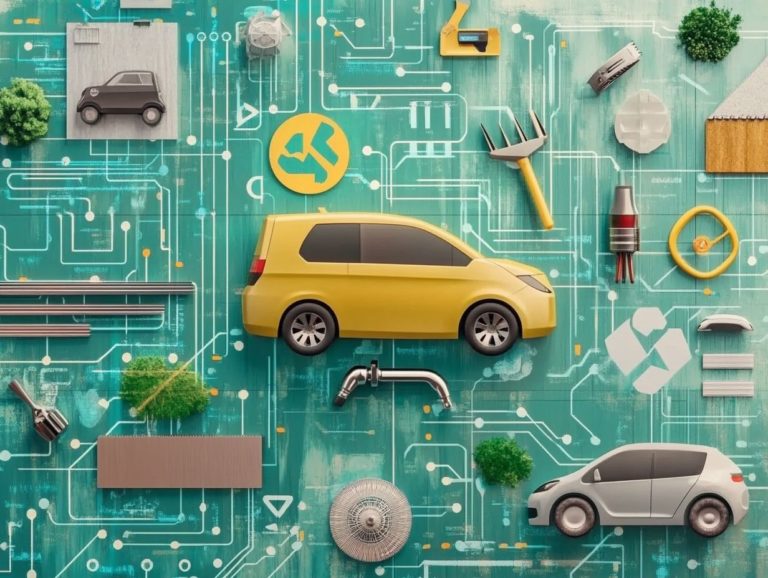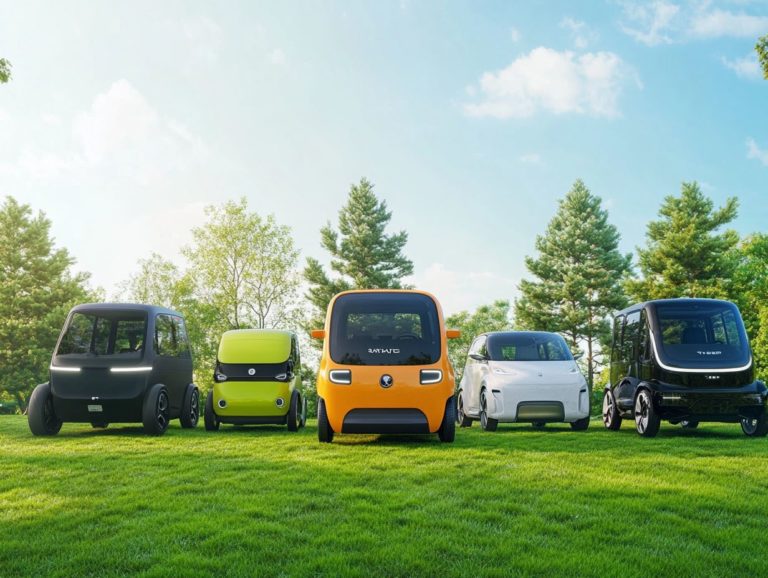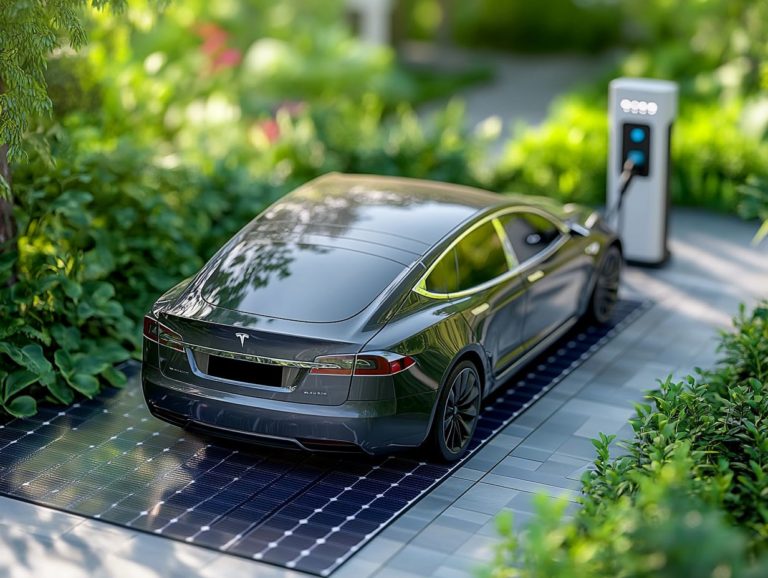The Environmental Benefits of Electric Vehicles
Let’s dive into the world of electric vehicles (EVs) and discover their impact! EVs are rapidly becoming the preferred choice for those seeking a sustainable alternative to traditional gasoline-powered cars. But what do they entail?
This article explores the environmental repercussions of gasoline vehicles, highlighting their harmful impacts on air quality and climate change. You’ll learn about the numerous benefits that electric vehicles offer, from significantly reducing emissions to conserving precious natural resources.
You will also explore the financial incentives available to consumers and the challenges ahead for the widespread adoption of EVs. Join in as you navigate this pivotal shift toward a greener future.
Contents
- Key Takeaways:
- Environmental Impact of Gasoline Vehicles
- Benefits of Electric Vehicles for the Environment
- Cost Savings and Incentives for Electric Vehicles
- Challenges and Solutions for Widespread Adoption
- Frequently Asked Questions
- What are the environmental benefits of electric vehicles?
- How do electric vehicles help reduce greenhouse gas emissions?
- Do electric vehicles use renewable energy?
- Are there any other environmental benefits of electric vehicles?
- Do electric vehicles have a positive impact on the economy?
- How can I contribute to the environmental benefits of electric vehicles?
Key Takeaways:
- Electric vehicles greatly reduce harmful emissions and pollutants, improving air quality and mitigating climate change.
- By using electricity instead of gasoline, EVs help conserve natural resources and decrease our dependence on fossil fuels.
- Choosing an EV can lead to significant cost savings and access to financial incentives for both consumers and governments.
What are Electric Vehicles?
Electric Vehicles (EVs) represent a groundbreaking shift in transportation, operating on electric power rather than traditional fossil fuels. This transition significantly reduces carbon emissions, bringing us closer to zero emissions—a goal aligned with global climate initiatives.
Countries like Norway, California, and China are ramping up EV sales, showcasing rapid industry evolution driven by advancements in batteries and an expanding charging network to meet energy demands and consumer expectations.
These vehicles come in distinct types. Battery Electric Vehicles (BEVs) run solely on electric batteries, while Plug-in Hybrid Electric Vehicles (PHEVs) combine an electric motor with a traditional engine. EVs operate using electric motors fueled by rechargeable batteries, particularly the popular lithium-ion variety, known for their efficiency and longevity.
Innovations in battery performance enhance driving range and enable the use of renewable energy sources. The benefits of EVs are plentiful: they reduce dependency on fossil fuels, lower operational costs, and contribute to cleaner air. In doing so, they play a crucial role in fostering a sustainable environment and advancing energy independence.
Environmental Impact of Gasoline Vehicles
Gasoline vehicles significantly impact the environment, largely due to their reliance on fossil fuels. This dependence escalates fuel demand, intensifies climate change, and increases greenhouse gas emissions.
The prevalent use of gas-powered cars highlights an urgent need for sustainable practices and alternatives to alleviate detrimental effects on our planet.
Effects on Air Quality and Climate Change
Gas-powered vehicles severely impact air quality, releasing pollutants contributing to greenhouse gas emissions and climate change. In cities grappling with smog and respiratory issues, the need for clean alternatives, such as electric vehicles, is increasingly clear.
According to the Environmental Protection Agency, transportation accounts for nearly 29% of total greenhouse gas emissions in the U.S., primarily due to gasoline combustion. These vehicles emit harmful pollutants like nitrogen oxides and particulate matter, which worsen health conditions like asthma and cardiovascular diseases. A study published in the Journal of the American Heart Association found that even short-term exposure to vehicle emissions poses significant health risks.
Transitioning to electric vehicles not only reduces these emissions but also plays a crucial role in achieving carbon neutrality, fostering a healthier environment and community for everyone.
Benefits of Electric Vehicles for the Environment
If you’re considering a more sustainable future, think about switching to an electric vehicle. It’s a choice that benefits both you and the planet!
Electric vehicles offer a wealth of advantages, particularly in reducing emissions and minimizing the overall carbon footprint of transportation.
By harnessing renewable energy sources and using advanced battery technology, EVs provide a sustainable alternative to gas-powered vehicles. They are crucial in the fight against climate change, significantly contributing to global climate objectives.
Reducing Emissions and Pollution
One of the primary advantages of electric vehicles is their potential to reduce emissions and pollution, leading to a cleaner environment. Unlike conventional vehicles, EVs produce zero tailpipe emissions, significantly lessening their impact on air quality.
It’s important to take a holistic view of the lifecycle emissions of electric vehicles, including energy used during driving and emissions from manufacturing and disposing of batteries.
The production of batteries, if not managed responsibly, can pose a significant environmental challenge.
A strong public charging infrastructure is crucial for promoting EV adoption. Addressing charging accessibility and range anxiety encourages more people to switch from gas-powered cars, making the transition to electric a more appealing and accessible choice.
Conserving Natural Resources
Electric vehicles play a pivotal role in conserving natural resources by reducing dependence on fossil fuels and promoting sustainable practices, such as battery recycling. By transitioning to EVs, you’re not just choosing cleaner transportation; you’re also supporting the development of electric vehicle batteries sourced through responsible practices.
This shift reduces greenhouse gas emissions and underscores the importance of sustainable lithium extraction, focusing on responsible land use and protecting ecosystems. Recycling EV batteries allows for the recovery of essential materials, minimizing the demand for virgin resources and reducing your overall environmental footprint.
Creating a closed-loop system for battery materials ensures resource consumption aligns with the conservation of natural ecosystems. This approach ultimately advances a more sustainable future for transportation technologies, paving the way for a greener tomorrow.
Cost Savings and Incentives for Electric Vehicles
Cost savings and various incentives linked to electric vehicles present a compelling case for both consumers and governments, helping to offset the higher initial costs of electric cars.
Programs offering consumer tax credits and rebates promote the adoption of zero-emission vehicles, showcasing the economic advantages of cleaner transportation alternatives.
Financial Benefits for Consumers and Governments
The financial benefits of electric vehicles extend to everyone, including governments. These benefits translate into significant savings through consumer tax credits and decreased healthcare costs tied to improved air quality. By investing in the electric vehicle industry, you can enjoy economic returns and contribute to sustainable development.
For instance, in the United States, federal tax credits can provide up to $7,500 when buying a fully electric vehicle. Many states add extra rebates, further lowering upfront costs and making EVs more accessible than ever.
Here’s a fact: a study from the International Council on Clean Transportation estimates that widespread adoption of electric vehicles could save Americans over $70 billion annually in fuel costs alone. Additionally, by reducing air pollution, governments could potentially save upwards of $18 billion each year in avoided health-related costs.
This highlights both the financial benefits and the positive environmental impact, paving the way for a healthier economy.
Challenges and Solutions for Widespread Adoption
Electric vehicles offer many advantages; however, challenges like charging infrastructure and battery-related issues can hinder their widespread adoption.
Addressing these concerns unlocks the full potential of electric vehicles, helping you embrace their environmental and economic benefits.
Addressing Infrastructure and Battery Concerns
Tackling infrastructure and battery concerns is crucial for enhancing your electric vehicle experience. Expanding public charging stations and improving battery life are key initiatives.
These efforts build consumer confidence and promote battery recycling.
A robust charging network is essential, as it directly affects the convenience and accessibility of owning an electric vehicle.
Recent advances in charging technology, such as ultra-fast chargers, have dramatically reduced charging times, allowing you to recharge your vehicle in minutes instead of hours.
Improved battery life is equally vital, with new developments enabling longer ranges between charges.
Backing strong battery recycling programs reduces environmental impact. By reusing materials, you conserve resources and minimize waste, paving the way for a greener future.
Frequently Asked Questions
What are the environmental benefits of electric vehicles?
Electric vehicles produce no emissions, helping cut air pollution and combat climate change.
How do electric vehicles help reduce greenhouse gas emissions?
Electric vehicles do not emit carbon dioxide, a major contributor to greenhouse gas emissions, making them a cleaner transportation option.
Do electric vehicles use renewable energy?
Electric vehicles can be powered by renewable energy sources like solar or wind power, reducing reliance on fossil fuels and further decreasing emissions.
Are there any other environmental benefits of electric vehicles?
Electric vehicles produce less noise pollution compared to traditional gas-powered vehicles, making them more environmentally friendly in urban areas.
Do electric vehicles have a positive impact on the economy?
Switching to electric vehicles can lead to economic benefits by reducing dependence on foreign oil and creating new jobs in the clean energy sector.
How can I contribute to the environmental benefits of electric vehicles?
You can choose to purchase or lease an electric vehicle or opt for public transportation or car-sharing services that utilize electric vehicles.
Consider making the switch to an electric vehicle today! Join the movement towards a sustainable future and embrace cleaner transportation options.

.jpg_00.jpeg)
.jpg_01.jpeg)
.jpg_10.jpeg)
.jpg_11.jpeg)




